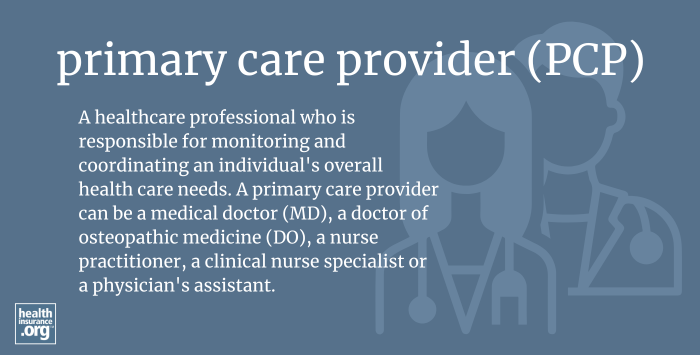
What is a primary care provider?
A health care professional who is responsible for monitoring and coordinating an individual's overall health care needs. Typically, a PCP serves as a "quarterback" for an individual's medical care, referring the individual to specialists as needed.
What type of provider can be a primary care provider?
A primary care provider can be a medical doctor (MD), a doctor of osteopathic medicine (DO), a nurse practitioner, a clinical nurse specialist or a physician's assistant.1
Several types of MDs can serve as a person's primary care provider:2
- Internal medicine doctors
- Pediatricians (if the patient is a child)
- Family medicine doctors (for patients of any age)
- OB/GYNs (obstetrics and gynecology)
- Internal medicine-pediatric doctors
Although OB/GYNs specialize in care related to the female reproductive system, the Affordable Care Act ensures that women have the option to choose an OB/GNY as their primary care provider, and cannot be required to obtain a referral from another PCP to see an OB/GNY.3
Why do I need a primary care provider?
If your health plan is an HMO or a POS plan, it will likely require you to have a primary care physician, and will assign one for you if you don't select your own (you always have the option to pick a different PCP). These plans generally require members to have a referral from their PCP to see a specialist.
If you have a PPO or an EPO, your plan will likely not require you to select a PCP, but you might want to have one anyway. This person will help to coordinate the care you receive from specialists and generally keep tabs on your overall health.
Footnotes
- "Primary Care Provider" Healthcare.gov. Accessed Oct. 8, 2024 ⤶
- "5 types of primary care doctors and how to choose which is right for you" HealthPartners. Accessed Oct. 8, 2024 ⤶
- "Obamacare and You: If You Are a Woman…" KFF.org. Oct. 14, 2013 ⤶
